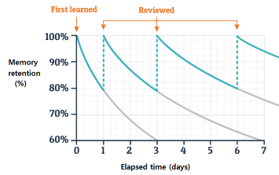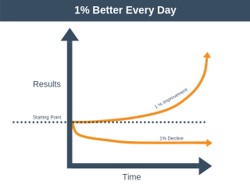Revision Tips


The Science of Learning
Research into cognitive science has provided us with advice of learning and what works best.
It had taught us three things about memory
- Your working memory is easily overloaded, cramming doesn’t work.
- Information is forgotten if not revisited.
- Practice and retrieval strengthen long term memory and boost learning.

What you should avoid
You should not revise using the following the following methods, they make you feel you are doing something effortful, but your brain isn’t working hard so it has little impact.
- Re-reading
- Highlighting
The most powerful methods, as shown on the right, aim to boost your memory by practice and retrieval.

- Revising in ‘topic blocks’ – it’s better to chunk these topics up and interleave them, spread the out
- Don’t cram all your revision at the end, it will overload your memory, so you won’t learn effectively
- “Excellence is not an art; it is the habit of practice”
- Review: Spend time revising a topic/unit
- Practice: Do an exam question/paper in time conditions
- Check: Compare it with a model answer, aim to improve
- Recalling information is simple but powerful – it tests your memory and boosting learning
- Try quizzes, past papers, essays, flashcards etc
- Dual coding involves combining words and images to help your learning by representing information visually
- Examples are timelines, mind-maps, flow diagrams etc
- Flashcards are an easy methods to revise
- Reduce your learning into small, easily revised chunks
- Utilise the Leitner System to maximise your learning

Power of Habits
Habits are incredibly powerful in helping you succeed. If you think about the greatest sportsperson, it is their habits of training and preparation (alongside their talent) which set them apart. The same is with revision.
It is great to have targets on what you want to achieve as they give you a goal and direction. However, it is your habits which allow you to best make progress.
As James Carr says, “Getting one percent better everyday counts for a lot in the long run”. Think of the progress you could make by starting your revision early.
Developing revision habits is hard and it takes time for them to ‘stick’.

Follow these four principles to build a habit

- Revise in one area, at the same time to establish habit
- Schedule and plan your revision per subject
- Leave your revision materials out ready to start
- Ensure you have a good quality diet and sleep

- Revise with friends and attend revision classes
- Have your family support you to keep you on track

- Start small, such as 10-minute bursts and build over time
- Reduce distractions – no phones
- Ask your family to encourage you e.g. quizzing you

- Start successful by easier tests/quizzes but ensure the challenge is still there
- Track your revision progress
- Do something enjoyable as a reward